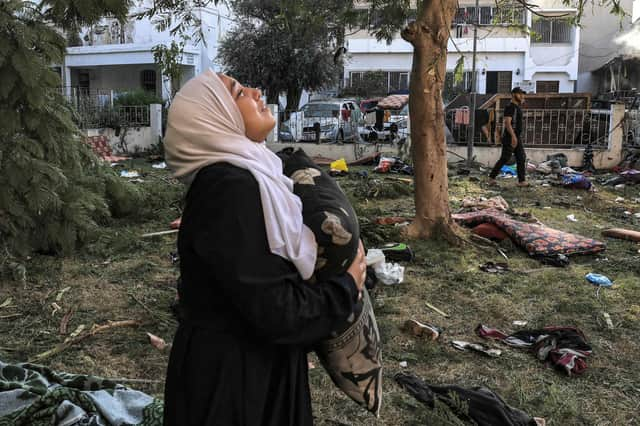Sunak visits Israel calling for ‘calm’ after hospital blast


The Prime Minister’s trip comes after he called for a “calm and cool” response to the blast at a Gaza hospital, as the UK government committed to publish an assessment of who was behind the blast.
Mr Sunak urged MPs yesterday not to “rush to judgment” as Israel and Hamas issued rival claims about the atrocity feared to have killed at least 500 people at al Ahli.
Advertisement
Hide AdAdvertisement
Hide AdAhead of today’s visit, he said: “Every civilian death is a tragedy. And too many lives have been lost following Hamas’ horrific act of terror.
“The attack on Al Ahli Hospital should be a watershed moment for leaders in the region and across the world to come together to avoid further dangerous escalation of conflict. I will ensure the UK is at the forefront of this effort.”
Earlier, in Tel Aviv, Mr Biden sided with Israeli Prime Minister Benjamin Netanyahu by telling him it "appears as though it was done by the other team, not you".
But Mr Sunak - who held talks with the National Security Adviser and the chairman of the Joint Intelligence Committee yesterday morning - said he would not "rush to judgment before we have all the facts on this awful situation".
At Prime Minister's Questions in the House of Commons, he said: "Our intelligence services have been rapidly analysing the evidence to independently establish the facts. We are not in a position at this point to say more than that."
During a visit to Essex yesterday afternoon, the Prime Minister said the "very heightened, sensitive situation" demanded "calm heads".
"This is obviously a complicated situation on the ground but it is right that we approach it with a calm and cool manner, don't rush to premature judgments, take the time to understands what's happened, that's what we're doing. "
Foreign Secretary James Cleverly told MPs: "We take note of what President Biden has said, but we will come to our own judgment, we will work on that quickly, and we will ensure that our assessment is put in the public domain as soon as we are confident of the details."
Advertisement
Hide AdAdvertisement
Hide AdDefence Secretary Grant Shapps stressed that misattributing responsibility for the blast could "make things worse" as he was questioned over the difference in position between the UK and Mr Biden.
Mr Shapps said "we don't yet know" who was behind the blast, adding: "I think it's really important that we give them the opportunity to gather those facts so we don't jump to conclusions."
Mr Sunak declined to back calls from more than 40 MPs for a ceasefire so that the release of hostages could be secured, international law could be upheld and medical supplies, food, fuel, electricity and water could be given to the Palestinian people.
Instead, he said that Israel had a "right to defend itself, to protect its people and to act against terrorism and ensure that the awful attack we've seen from Hamas cannot happen again".
Mr Sunak said the UK was continuing to press to get humanitarian aid into Gaza and was "working around the clock" to free British hostages taken by Hamas.
Following the session of Prime Minister's Questions he met the family of one of those captured.
At least seven British nationals, including 13-year-old Yahel Sharabi, were killed in the Hamas raids on Israel on October 7.
Downing Street said that nine UK nationals remain missing, with some of those feared dead, while others could be among the hostages taken back to the Gaza Strip.
Advertisement
Hide AdAdvertisement
Hide AdHamas said an Israeli air strike led to the devastation at the al Ahli hospital.
Gaza's Hamas-run health ministry said at least 500 people were killed.
But the Israeli military blamed a misfiring rocket from the Palestinian Islamic Jihad group and released imagery and communications intercepts aimed at supporting their case.
Hundreds of Palestinians have taken refuge at al Ahli and other hospitals in Gaza City in the past few days, hoping to be spared bombardment after Israel ordered all residents to evacuate to the southern Gaza Strip.
The hospital was run by the Anglican church - and Archbishop of Canterbury Justin Welby said he was in "profound mourning" after the "atrocious" strike.
Israel opened perhaps the first crack in its ten-day siege on the Gaza Strip yesterday when it said it will allow Egypt to deliver limited quantities of humanitarian aid.
Mr Netanyahu's office said Israel "will not thwart" deliveries of food, water or medicine, as long as they are limited to civilians in the south of the Gaza Strip and do not go to Hamas militants. The statement made no mention of badly needed fuel.
It was not clear when the aid would start flowing.
At the Rafah crossing, Gaza's only connection to Egypt, truckloads of aid have been waiting for days to enter. But the facility has only a limited capacity, and Egypt says it has been damaged by Israeli air strikes.
Advertisement
Hide AdAdvertisement
Hide AdAfter the hospital blast, Jordan cancelled a meeting between Mr Biden, Jordan's King Abdullah II, Palestinian President Mahmoud Abbas and Egyptian President Abdel Fattah El-Sisi.
The war between Israel and Hamas was "pushing the region to the brink", Jordanian foreign minister Ayman Safadi told state-run television.